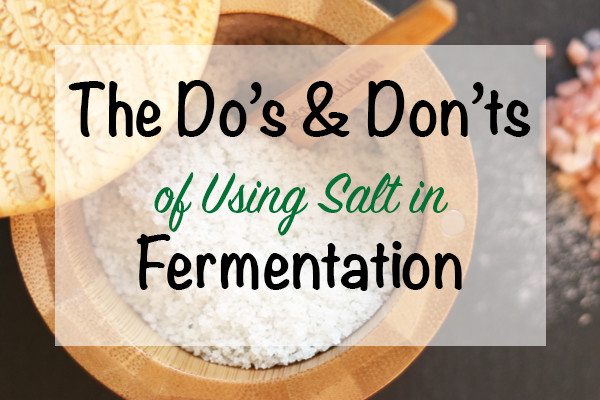
The type of salt you use for fermentation is very important. Salt is necessary to preserve the ferment and can add rich minerals, nutrients and flavor if you choose the right one.
With so many different choices of salt available to us, (fine, course, blocks, red, black, grey, pink), determining which salt to use can get confusing and a little overwhelming.
Which types of salt should you use for fermentation?
Here is a list of the do’s and don’ts of using salt in fermentation.
Don’t use…
Refined Table Salt is the most common type of salt used in the American diet. It’s 97% sodium chloride and all the trace minerals have been removed from it. Anti-caking agents are added to table salt to keep it from clumping and most contain iodine. Don’t use table salt in your ferments. The chemicals and use of iodine can inhibit the fermentation process and lead to salty tasting fermented vegetables or sauerkraut.
Kosher Salt is a course salt and similar to table salt in that it’s refined and some contain anti-caking agents. If you use kosher salt, it will make your fermented vegetables taste too salty. I don’t recommend using kosher salt.
Pickling Salt is a refined salt with no additives. Although it’s free of additives I still avoid it, because its refined.
Do use…
Sea Salt is made from evaporated salt water and therefore has more trace minerals and less sodium than table salt. Even some sea salts can be refined and stripped of their mineral content. I recommend using a mineral rich unrefined sea salt, such as Celtic Sea Salt in your ferments. Salts like this contain many trace minerals.
Mineral rich salt mined from ancient sea beds like pink himalayan salt from Pakistan contain many beneficial trace minerals. I highly recommend these types of salts, because they are rich in minerals and taste great.
The salt you use can change the flavor of your fermented vegetables and sauerkraut. Salts depleted of their minerals and that are high in sodium chloride like table salt, have a harsher salty flavor, while mineral rich sea salts have a more mild salty flavor and can taste slightly sweet.
I challenge you to do a side-by-side salt tasting to see if you can tell the difference between the different types of salts. You’ll be surprised of the difference. And I challenge you to use unrefined mineral rich salt in your next fermentation to boost flavor and nutrients.
Happy Fermenting!
Danielle
Some links on this page are affiliate links and they are all for companies that I support and buy from myself. If you decide to purchase any of these products through these links, I will earn a small commission and you will have my sincere thanks for supporting Fermented Food Lab.
Original article and pictures take www.fermentedfoodlab.com site
Комментариев нет:
Отправить комментарий